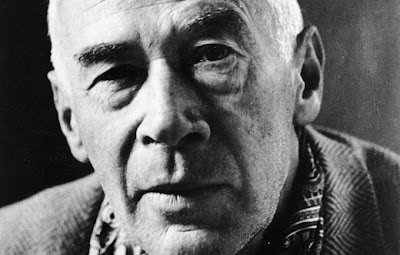Emerson & Henry Miller: Strange Bedfellows?
 |
| Henry Miller, circa 1959 |
Who knew that Henry Miller was an Emersonian? I don't think Ralph Waldo put too many descriptions of orgies or bathroom sex down on paper, that's for sure. But here we have Miller, in Sexus, nearly plagiarizing the great Transcendentalist.
Every day we slaughter our finest impulses. That is why we get a heartache when we read those lines by the hand of the master and recognize them as our own, as the tender shoots we stifled because we lacked the faith to believe in our own powers, our own criterion of truth and beauty. Every man, when he gets quiet, when he becomes desperately honest with himself, is capable of uttering profound truths. We all derive from the same source. There is no mystery about the origin of things. We are all part of creation, all kings, all poets, all musicians; we only have to open up, only to discover what is already there.In "Self-Reliance," written many decades before Miller was writing, Emerson makes the same case, albeit without Miller's tone of existential despair.
To believe in your own thought, to believe that what is true for you in your private heart is true for all men, -- that is genius. . . . In every work of genius we recognize our own rejected thoughts: they come back to us with a certain alienated majesty.I love that: a certain alienated majesty. Now, the Miller-Emerson connection actually isn't so strange, since both men were aligned in varying degrees with 19th century Romanticism. In fact, in Sexus Miller reveals the nature of his allegiance in a scene that takes place at the studio of his artist friend Ulric. Another group of people is visiting the studio, too, and when one makes some disparaging remarks about Walt Whitman, Miller just can't contain himself.
So when the cultured young gent from Durham tried to cross swords with me about my favorite American writer I was at him hammer and tongs. As usual in such circumstances I overshot the remark. The place was in an uproar. Apparently they had never seen anyone so earnest about an unimportant matter.I've seen no better description of the Romantic temperament than being earnest about unimportant matters. I know where he's coming from. For the Romantic, mere ideas and poems and interactions do matter greatly. The subjective and aesthetic experience of life is paramount; a life and death matter, truth be told.
Comments
Post a Comment